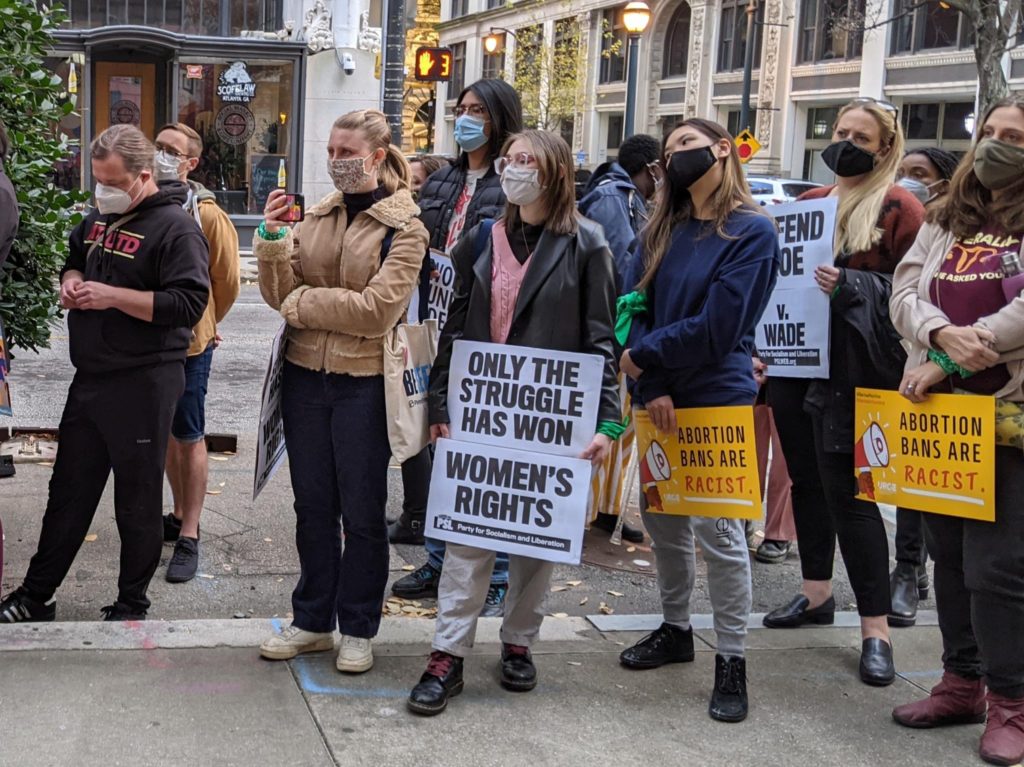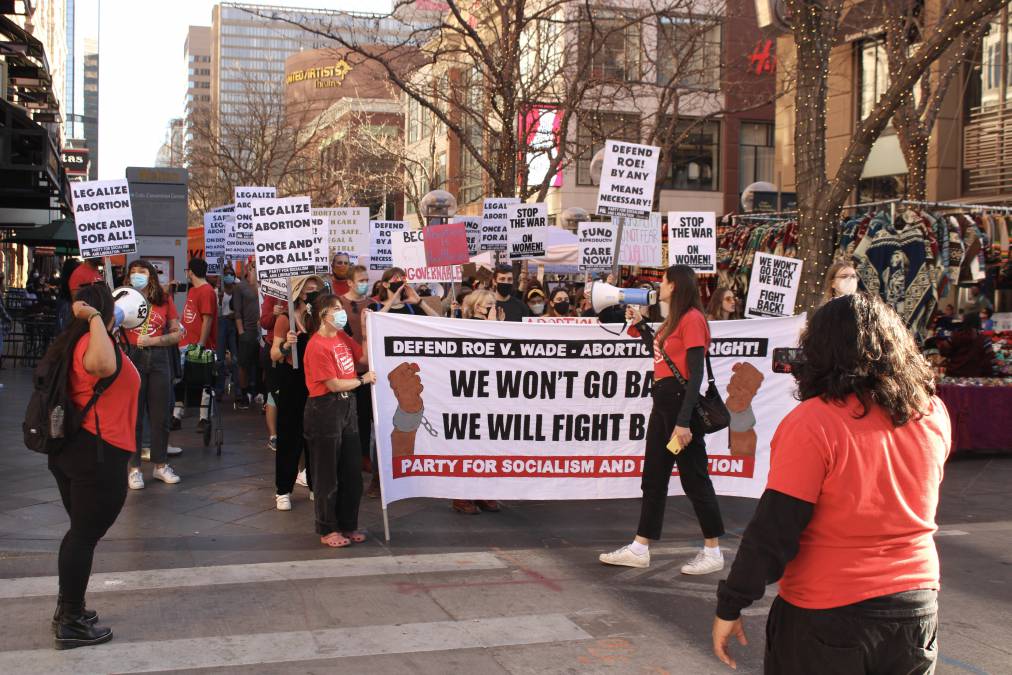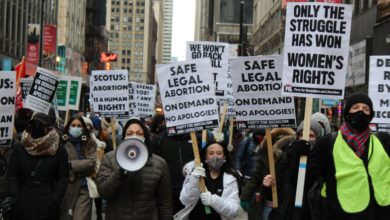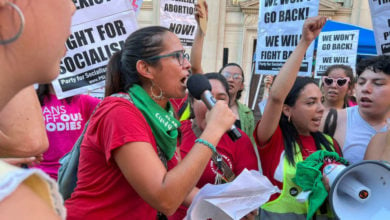On Dec. 1, the U.S. Supreme Court heard oral arguments in Mississippi case Dobbs v. Jackson Women’s Health Organization to evaluate whether state laws that ban pre-viability abortions are unconstitutional. The Supreme Court’s agreement to review the Mississippi 15-week abortion ban unquestionably threatens nearly 50 years of Supreme Court precedent and is a test case to overturn Roe v. Wade. Around the U.S., advocates for reproductive justice rallied in cities large and small in support of the fundamental right to abortion care. Liberation News was there.
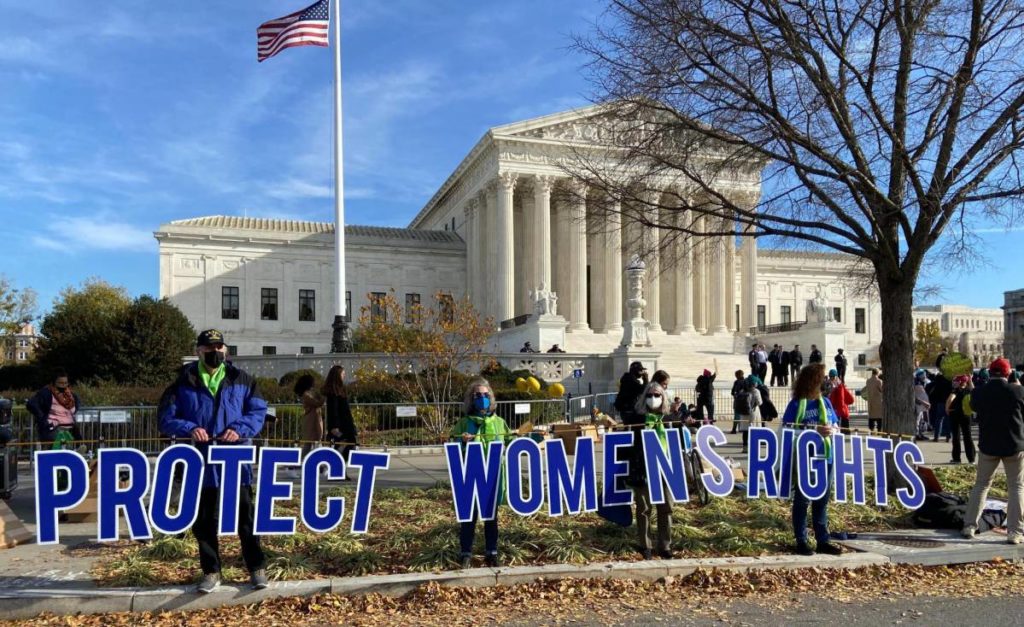
In Washington, D.C., two rallies one right after another, converged outside the U.S. Supreme Court to demand that women be able to control their own bodies, futures, and lives — including access to safe, affordable abortion healthcare. Hundreds of supporters throughout the day came to support women’s rights, hearing from many inspiring speakers who had benefited from abortion care. The message was clear: Women are fighting back and will not sit back as a political body of unelected and unaccountable life-term political figures discuss their basic rights and needs.
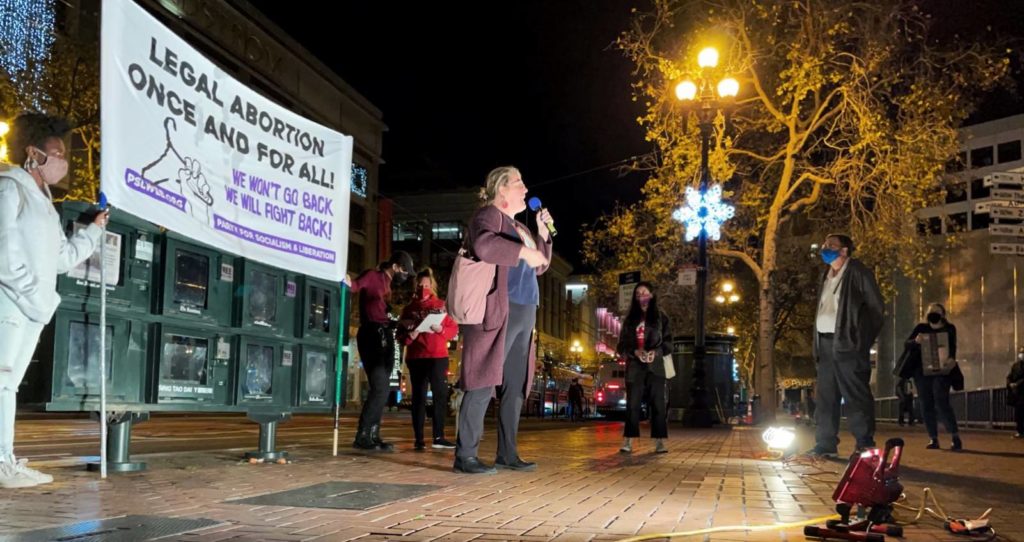
The Bay Area branch of the PSL held a speakout in the heart of downtown San Francisco, on the evening of Dec. 1. With workers commuting home, running errands, and holiday shoppers stopping to listen and support, speakers connected the dots from the struggle to defend abortion to the overarching system of capitalism that neglects and exploits women. Nathalie Hrizi, Vice President of Substitutes for United Educators of San Francisco, and national editor of Breaking the Chains Magazine, shared her experience of being a mother and a worker: “I am well aware that every time I got pregnant, there was no sustainable support … when we’re pregnant, when we give birth, and when we try to care for our children.” PSL organizer, Binx Ramos, explained the history of women’s oppression, and urged that we must do away with capitalism: “My comrades and I stand up for gender liberation, but liberation cannot and will not ever happen under this economic system of capitalism. … It is not a dream to imagine women’s emancipation and queer emancipation — it is a reality, today. Women hold up half the sky!”
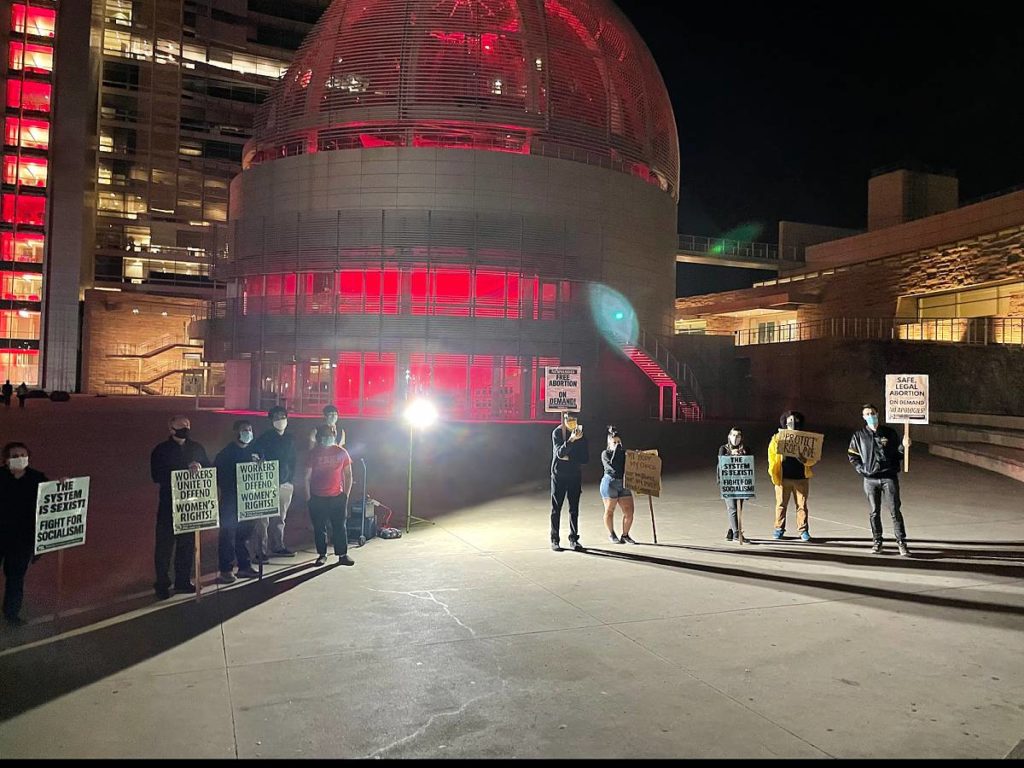
PSL in the South Bay region gathered at San Jose City Hall with local groups — Hero Tent, Anakbayan, SEIU, Chicano Moratorium Resistance Council — and community members in support of the Women’s Healthcare Protection Act and women’s liberation. Organizers and community members spoke out on the possibility of women losing access to abortion and reproductive rights. In particular, on the direct impact an abortion ban would have on poor, Black, Indigenous, and women of color. Illuminating the foreground of the Dec. 1 action, City Hall was lit up in red, honoring World AIDS Day, showing support for the tens of millions living with HIV and honoring those who have died. This highlighted that both the original fights for abortion rights and for recognition of the AIDS crisis were militant struggles for liberation, continuing today.
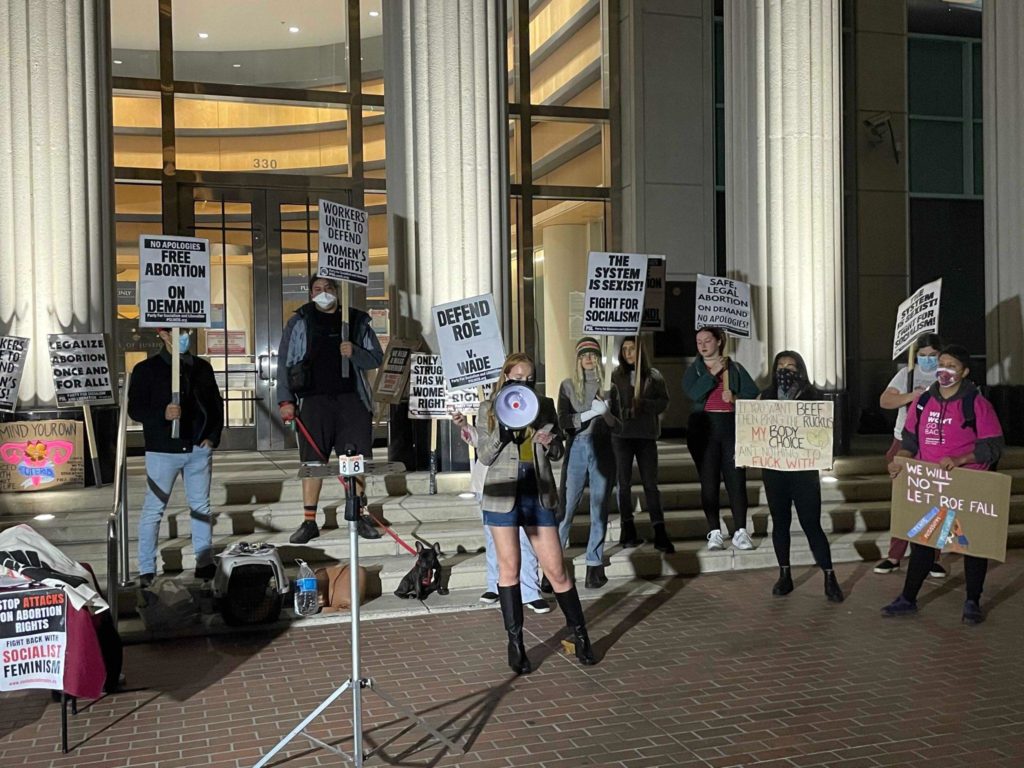
Members of PSL San Diego, Peace & Freedom Party SD, Sunrise Movement SD, SD Socialist Alternative, Armadillos Search & Rescue, and SD Leonard Peltier Defense Committee, and other community members gathered in front of the San Diego “Hall of Justice” to demand protections for abortion rights. Many passersby stopped to hear a speech from PSL member Tori Barron, who works full time at Planned Parenthood. She spoke about not only the need to defend Roe v. Wade, but also the right-wing attacks that workers and doctors face for performing safe and legal abortions. “Let me be clear,” Barron said, “these people who are pushing lawmakers to challenge safe and legal abortions are not pro-life. They are pro-forced birth, pro-forced pregnancy and pro-control.” Cars honked in support as they drove past the rally, and even young lawyers leaving the courthouse stopped to chant along with the crowd.

Activists hit the streets in Davis, California for an evening rush hour protest to say loud and clear, “My body, my choice!” The action happened at a busy intersection and traditional protest area in the university town. Commuters supported the protest with enthusiastic honking throughout the action. Many drivers and commuting bicyclists thanked demonstrators for being on the streets, and took leaflets. Workers getting off work told protesters they supported them. The response from the community was overwhelmingly positive. Spirited chants throughout the action included, “My body, my right! We won’t give up without a fight!” Chanting echoed off the walls of the nearby city hall throughout the protest. Demonstrators pledged to return to the streets to fight for women’s equality until the right to abortion was won once and for all.
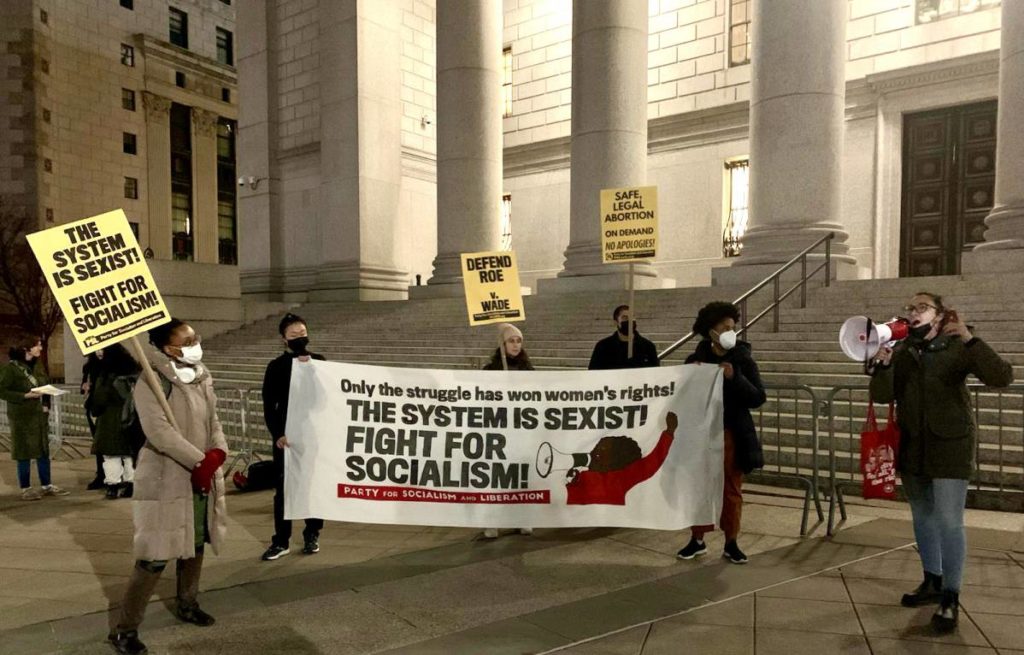
About 30 people gathered at the New York County Courthouse in Manhattan at 5 p.m. for a rally organized by the Party for Socialism and Liberation to legalize abortion once and for all. Speakers connected the system’s attacks on reproductive health care to the Ghislaine Maxwell trial taking place just steps away at the U.S. Court of Appeals for the Second District — both demonstrating that the ruling class, Democrat and Republican alike, is entrenched in perpetuating women’s exploitation. While the militant agitation went on, organizers also petitioned for the Women’s Health Protection Act, explaining to passersby the importance of passing this act in order to protect to right to abortion access for women across the country.
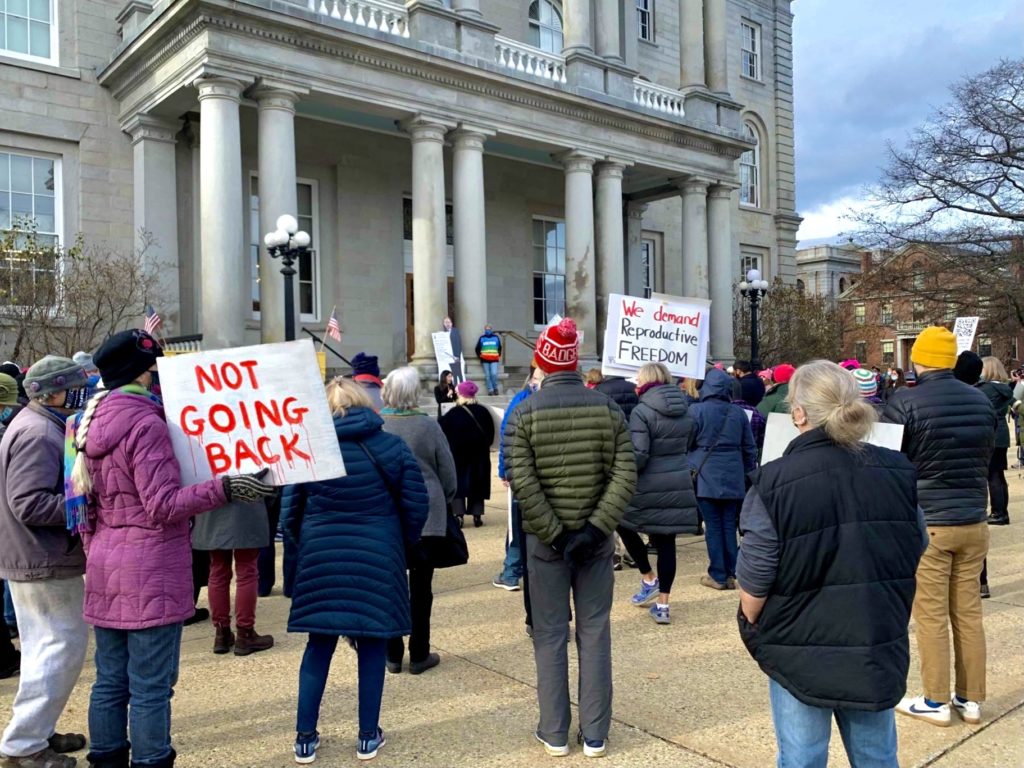
In New Hampshire in the morning of Dec. 1, some 200 people gathered at the State House in Concord, organized by Planned Parenthood NH Action Fund, and co-sponsored by Kent Street Coalition, National Association of Social Workers – NH, and Granite State Progress. State Rep. Maria Perez told Liberation News: “I’m here because abortion is something that is affecting all of us, especially victims [of sexual assult]. … And I’m here to speak up for those who don’t have a voice or whose voices have been shut down. Abortion should be our right … we should be able to decide what’s happening to our bodies. I’m here to let Governor Sununu know that his decision should be for us and not just for him, or whatever’s convenient for his political campaign. He should be thinking about a woman’s right to choose…”
Later that day, members of Party for Socialism and Liberation – Southern New Hampshire and organizers with Reproductive Freedom Fund NH, Occupy NH Seacoast, and the Seacoast Overpass Light Brigade held a visibility action in Market Square, Portsmouth at 5 p.m. Attendees flyered for a community discussion on reproductive rights the following Sunday, and petitioned for passage of the Women’s Health Protection Act. The overpass light brigade brought lit up letters spelling out “ Roe v. Wade,” while RFF — the state’s only abortion fund — held a banner with a QR code to collect donations to fund abortion access.
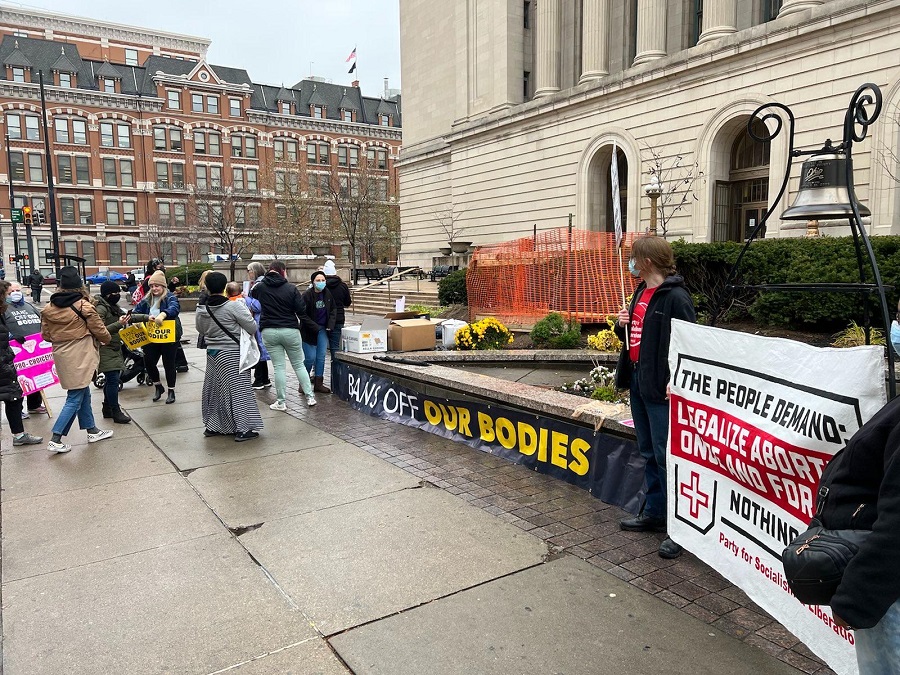
At the Hamilton County Courthouse in Cincinnati at 12 p.m., local organizers and activists attended a speak out organized by Planned Parenthood. Attendees shared their personal experiences with abortion, and why abortion access is necessary healthcare. NARAL, Equality Ohio, United We Stand Cincinnati, and the Party for Socialism and Liberation were all in attendance.
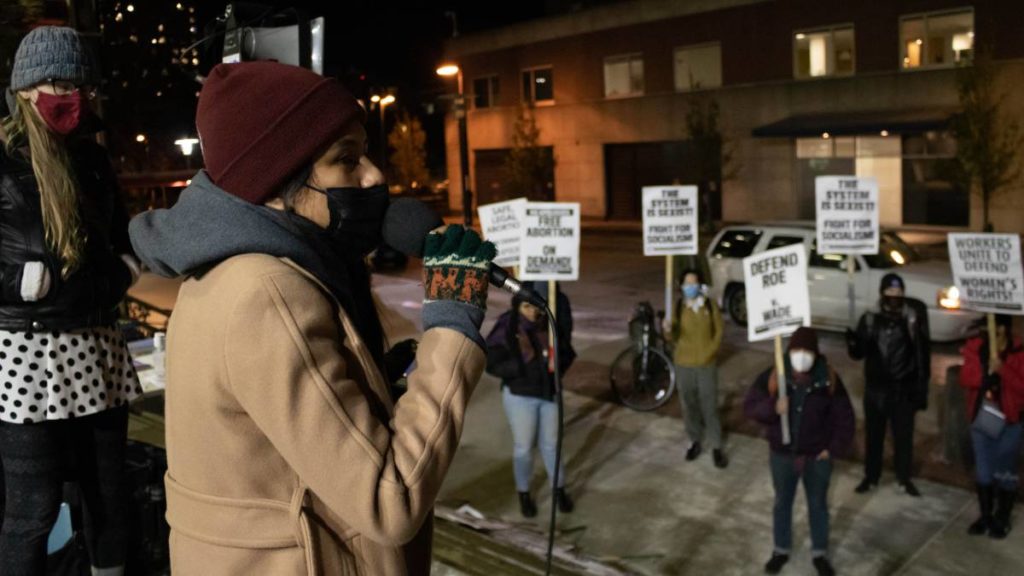
On the nationwide day of action to defend abortion, about 20 people rallied outside the busy Ruggles train station in Boston in 30 degree weather. Speakers from Boston DSA, Public Higher Education Network of Massachusetts and Boston PSL spoke to the crowd as people on their evening commutes stopped to listen. Organizer Kim from the Party for Socialism and Liberation highlighted in her speech: “The lesson we must carry with us today is that it’s not the act of an enlightened politician or progressive stench in the air that brought about Roe, but that ALL change comes from struggle. So I invite all of you here to continue to join us in this struggle, to stay connected and organized because the fight has never stopped.”
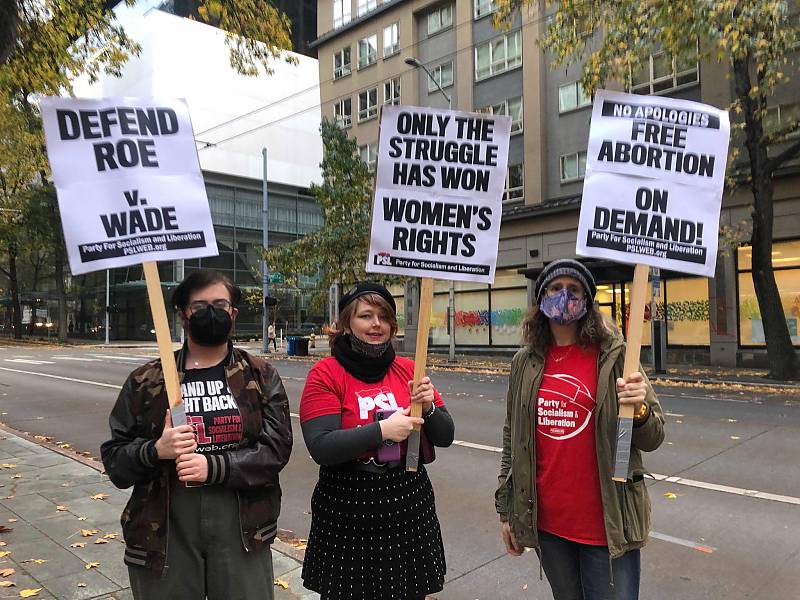
In Seattle, protesters with Radical Women and Party for Socialism and Liberation rallied outside the Federal Courthouse in downtown at 7 a.m., while across the state in Pasco, Wash., the PSL and the Womxn’s March gathered after the sun had set to make their position clear.
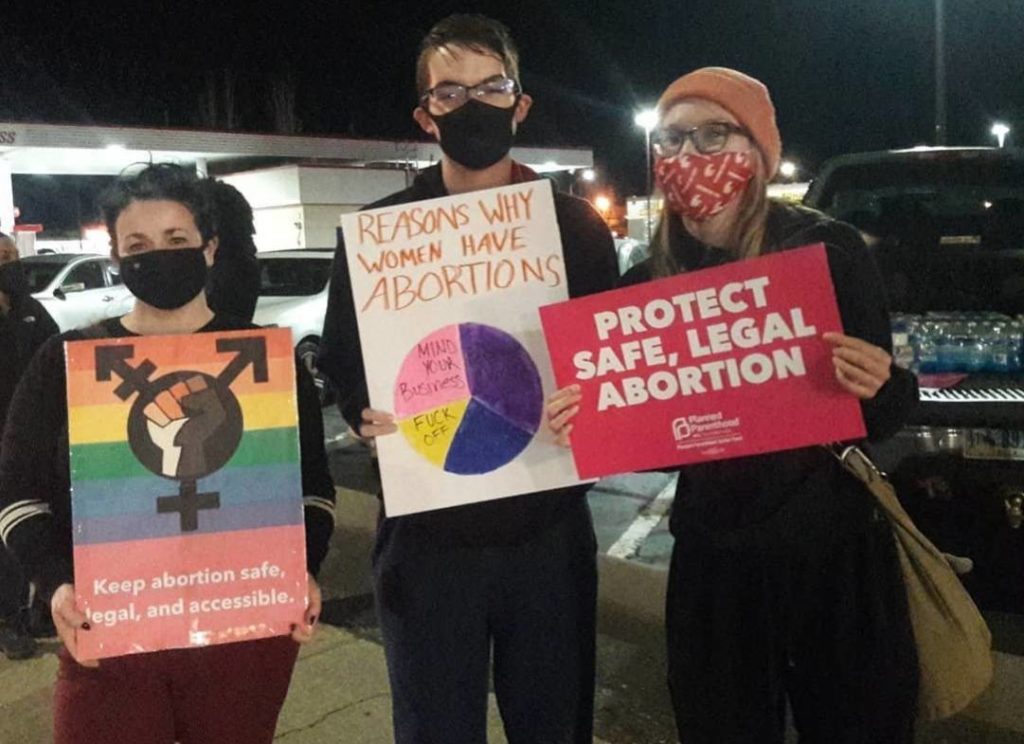
In Jackson, Miss., the organizations SHERO Mississippi, Mississippi Abortion Access Coalition, Planned Parenthood Southeast, Immigrant Alliance for Justice and Equity, and Mississippi in Action held a rally in support of abortion access and against the overturn of Roe v. Wade. The rally was attended by more than 100 people, among them activists from Texas, Louisiana and Alabama.
A few counter-protesters tried and failed to get the attention of attendees, who blocked their hatred out with chants and signs. Speakers addressed how abortion access is an issue for workers and people of color in particular. Lakeesha Harris, with LA Storyteller in Louisiana said: “It’s a workers’ rights issue in a time of a pandemic where most workers are having a hard time finding resources that’s adequate to sustain life: rent, food, diapers, everything that costs money, including abortion access.”

Mississippi is one of 11 states that opted out of medicaid expansion under the Affordable Care Act, it is these same legislators that are proposing an effective ban on abortion. Darius Nelson, a Jackson resident attending the rally commented on this hypocrisy saying: “Why is abortion murder, but no access to healthcare is not more murder? We are concerned about fetuses, but you are not actually concerned about human beings on this Earth.”
Kayla Roberts with the Mississippi Reproductive Freedom Fund said: “When I say abortion is healthcare, it goes back to when women are getting raped, women are not physically able to hold a child. That’s when I say healthcare because this is things I feel like the government should pay for. Everybody is talking about healthcare like it pays for the stuff you need: your medicine, your surgeries. What is abortion? A surgery and healthcare.”
Abortion access is particularly scarce in rural Mississippi, where distance from the state’s only clinic and social stigma are huge factors. Lorena Quiroz, an organizer with the Immigrant Alliance for Justice and Equity, told the story of an Indigenous immigrant woman from rural Mississippi who had to deal with the lack of access in the state and why it inspires her to fight:
“I’m here because she did not have access to abortion.
I’m here because she cannot stand before you because of the trauma she carries in her body.
I’m here because she was forced to endure a pregnancy that still brings her pain.
I’m here because this woman had the right to decide over her body.
We’re here to fight for the right to choose.
We’re here for the right for safe abortions.
We’re here to fight, and we’re not gonna back down.
We’re not gonna stop resistance until we have safe abortions for all!”
